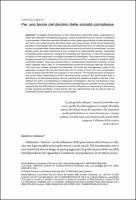Chapter Per una teoria del declino delle società complesse
Author(s)
Bellanca, Nicolò
Pardi, Luca
Language
ItalianAbstract
To explain social decline, a first mechanism notes that elites, understood as small and relatively homogeneous groups, have a superiority to act in concert, compared to the masses. When the capitalist dynamics offers great opportunities to take advantage, and when such opportunities distribute costs over large groups, while concentrating the benefits in a few hands, then the elites have an incentive to intervene. To maintain privileged access to opportunities, elites seek alliances and resort to all forms of social power. Society decays when this path transforms it into a network of particularistic groups, committed to dividing given resources, instead of innovating and improving. A second mechanism is based on the responses of complex societies to challenges. The answers try to bridge the gap between the complexity of the control system and the increased complexity of the controlled system. They may consist either in constructing hierarchical modules, so that many subjects obey a few, or in multiplying the connections through reticular structures. The more the answer stratifies the hierarchy, the more the management costs of the apparatus increase. On the other hand, the more it insists on links, the more coordination costs increase between the many players in the network. The society tends to swing from one to the other, depending on which becomes more onerous. But both modes lead in the long run to decreasing energy returns, pushing the system on a path of decline. Even without the claim of composing an exhaustive investigation, the two mechanisms arise from some of the most relevant and recurrent characteristics of complex human societies: respectively, the difficulties of cooperation and the difficulties of responding to the arising of new systemic problems. In this sense, the two mechanisms may be able to help us understand what happens and what could happen.


 Download
Download Web Shop
Web Shop